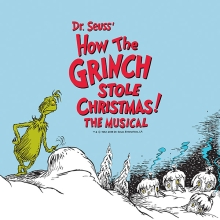MTI Responds to University's RENT Script-Changing Violation
MTI Responds to University's RENT Script-Changing Violation
By Jason Cocovinis on April 28, 2011
in
Announcements, Show/Author Spotlight
| Tags:
In the News, Rent
 MTI wishes to address an important copyright issue surrounding a recent production of RENT at Maryland's Towson University in which director Diane Smith-Sadak cut lines from the show creating an alternate ending.
MTI wishes to address an important copyright issue surrounding a recent production of RENT at Maryland's Towson University in which director Diane Smith-Sadak cut lines from the show creating an alternate ending. BroadwayWorld.com reported on the controversy this morning, after being made aware of the issue from the activity it generated on their message boards. Much of the discussion revolved around remarks made by Smith-Sadak in an article entitled "Rent's Script Edits Violate Copyright" on Towson's news site, The Towerlight, in which she attempted to defend her breach of contract, often using erroneous facts about MTI and the business of theatrical licensing in general. In situations such as these, it is MTI's job to educate the public about our role as protectors of our author's and/or their estate's intellectual property. MTI's President, Drew Cohen responded to Smith-Sadak's comments, explaining what is allowed and not allowed when organizations sign a contract to perform an MTI musical:
I recently read Diane Smith-Sadak’s Letter to the Editor regarding her production of RENT at Towson University and, specifically, her disappointment (outrage?) at not being allowed to alter Jonathan Larson’s Pulitzer-Prize winning script. Upon reading her letter, I was a bit disheartened that somehow MTI’s efforts to explain clearly the conditions under which a producer may present any of the musicals that we license had been unsuccessful, even in this one single case. However, readers’ responses to Ms. Smith-Sadak’s letter made clear to me that this was indeed an aberration, not just in terms of it being a rare example of an altered show, but also in terms of Ms. Smith-Sadak’s stated position representing a vocal minority rather than the general consensus. What a relief.
Given the general population’s understanding of the basic rules of licensing, I can dispense with justifying these rules based on the fundamentals of Copyright Law, which prohibited Ms. Smith-Sadek’s changes, and I can forego the discussion of basic contract law, which requires Towson (and its employees/agents) to abide by the stated terms of the performance license that they were granted by MTI (e.g., no changes to the material are permitted). But even if we (or most of us) agree that Ms. Smith-Sadak’s actions were inappropriate, I do feel compelled to address a few of her statements.
“This whole giant mess comes down to the bottom line of dollars and cents.” Well, no. In fact, I do not see any connection between this “mess” and money. Whether or not Towson’s production presented RENT as written by Jonathan Larson or RENT with a different ending authored by Ms. Smith-Sadak, Towson would be paying MTI for the right to produce the show. As many of you know, most of those royalties go directly to the show’s rights holders, i.e., the Larson Family. MTI’s insistence that Towson abide by the rules of our performance license (and copyright law) had nothing to do with money. If Ms. Smith-Sadak had decided to produce RENT without a license and without paying for the rights, perhaps then her “dollars and cents” argument would not be completely baseless. There is certainly an element of commerce in the business of licensing shows. Here, however, that element did not come into play. Here, our goal was simply to prevent someone from representing their production as being RENT, when everyone agrees it was not RENT.
“What would [Jonathan Larson] think of what has happened to this production, being in the hands of corporations and attorneys?” I did not know Jonathan Larson, and I would guess that Ms. Smith-Sadak did not know him either. However, I do know Jonathan’s family and over the past several years, I have become friends with his father, Al Larson. Al, his wife, Nan, and Jonathan’s sister, Julie, all have devoted themselves to preserving, perpetuating and protecting the memory of Jonathan, as well as his work. Having worked with hundreds of authors and their representatives, I can describe the passion of their dedication as extraordinary. For Ms. Smith-Sadak to accuse them, even indirectly, of leaving the responsibility of protecting RENT “in the hands of corporations and attorneys” is inaccurate, insulting, and just plain wrong. Ms. Smith-Sadak may not be happy that she was caught breaking the rules, but for her to wave her finger at others, particularly the Larson family as underlying rights holders, is unacceptable.
It is worth noting that the Larson family has shown themselves to be quite open-minded with regard to the issue of modifying Jonathan’s work in instances where they were in fact asked about the changes in advance. Most significantly, they authorized the creation of RENT SCHOOL EDITION, which is designed for high school productions of the show. While the heart and soul of the show remain firmly intact, the School Edition eliminates some of the profanity in the script and one song (Contact). This was done so that the show would be more “produceable” by high school students across the country, so that they could use the show to discuss the issues raised by the show in their communities. Significantly, the School Edition represents an approved version of the show, expressly authorized by– and indeed created by– the show’s lawful rights holders. As I understand it, Ms. Smith-Sadak never requested permission from MTI or the rights holders to make her changes to the material.
“But when fear dominates – fear of reprimand, fear of shut downs which cause loss of box office revenue – the artistic process and perhaps the product – suffers.” This statement is both arrogant and presumptuous. I can only read from this that Ms. Smith-Sadak believes that her product (i.e., the changed version of RENT) was better than RENT as written by Jonathan Larson. How else could she mean that the product is suffering? While opinions of course vary, all I can suggest is that she take it up with the Pulitzer Committee. Or the Tony Committee. Or the millions of fans of RENT whose love for the show has prompted producers to bring RENT back to New York City this summer. We all have thought about different endings for stories we love. What if Ilsa didn’t get on the plane and leave Rick behind? What if Roy Hobbs had struck out (as he did in the underlying book)? What if Rosebud was Charlie Kane’s dog? What if Elaine didn’t get on the bus with Benjamin? We can certainly imagine a different ending, but we know we cannot present those alternate endings without permission of the rights holders.
This was not about commerce or fear or delegating responsibility to lawyers. This was about one person deciding that she could write a better show than the one that was licensed and opting to present it in violation of the performance license. Respectfully, that is simply not allowed.
Drew Cohen
President
Music Theatre International
jfdghjhthit45

























